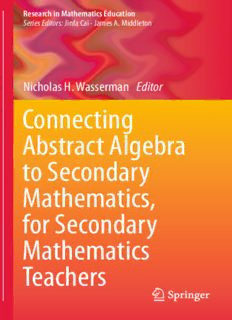
Connecting Abstract Algebra to Secondary Mathematics, for Secondary Mathematics Teachers PDF
Preview Connecting Abstract Algebra to Secondary Mathematics, for Secondary Mathematics Teachers
Research in Mathematics Education Series Editors: Jinfa Cai · James A. Middleton Nicholas H. Wasserman Editor Connecting Abstract Algebra to Secondary Mathematics, for Secondary Mathematics Teachers Research in Mathematics Education Serieseditors JinfaCai,Newark,DE,USA JamesA.Middleton,Tempe,AZ,USA Thisseriesisdesignedtoproducethematicvolumes,allowingresearcherstoaccess numerousstudiesonathemeinasingle,peer-reviewedsource.Ourintentforthis series is to publish the latest research in the field in a timely fashion. This design isparticularlygearedtowardhighlightingtheworkofpromisinggraduatestudents and junior faculty working in conjunction with senior scholars. The audience for this monograph series consists of those in the intersection between researchers andmathematicseducationleaders—peoplewhoneedthehighestqualityresearch, methodological rigor, and potentially transformative implications ready at hand to helpthemmakedecisionsregardingtheimprovementofteaching,learning,policy, andpractice.Withthisvision,ourmissionofthisbookseriesis: 1. To support the sharing of critical research findings among members of the mathematicseducationcommunity; 2. Tosupportgraduatestudentsandjuniorfacultyandinductthemintotheresearch communitybypairingthemwithseniorfacultyintheproductionofthehighest qualitypeer-reviewedresearchpapers;and 3. Tosupporttheusefulnessandwidespreadadoptionofresearch-basedinnovation. Moreinformationaboutthisseriesathttp://www.springer.com/series/13030 Nicholas H. Wasserman Editor Connecting Abstract Algebra to Secondary Mathematics, for Secondary Mathematics Teachers 123 Editor NicholasH.Wasserman DepartmentofMathematics,ScienceandTechnology TeachersCollege,ColumbiaUniversity NewYork,NY,USA ISSN2570-4729 ISSN2570-4737 (electronic) ResearchinMathematicsEducation ISBN978-3-319-99213-6 ISBN978-3-319-99214-3 (eBook) https://doi.org/10.1007/978-3-319-99214-3 LibraryofCongressControlNumber:2018962925 ©SpringerNatureSwitzerlandAG2018 Thisworkissubjecttocopyright.AllrightsarereservedbythePublisher,whetherthewholeorpartof thematerialisconcerned,specificallytherightsoftranslation,reprinting,reuseofillustrations,recitation, broadcasting,reproductiononmicrofilmsorinanyotherphysicalway,andtransmissionorinformation storageandretrieval,electronicadaptation,computersoftware,orbysimilarordissimilarmethodology nowknownorhereafterdeveloped. Theuseofgeneraldescriptivenames,registerednames,trademarks,servicemarks,etc.inthispublication doesnotimply,evenintheabsenceofaspecificstatement,thatsuchnamesareexemptfromtherelevant protectivelawsandregulationsandthereforefreeforgeneraluse. Thepublisher,theauthors,andtheeditorsaresafetoassumethattheadviceandinformationinthisbook arebelievedtobetrueandaccurateatthedateofpublication.Neitherthepublishernortheauthorsor theeditorsgiveawarranty,expressorimplied,withrespecttothematerialcontainedhereinorforany errorsoromissionsthatmayhavebeenmade.Thepublisherremainsneutralwithregardtojurisdictional claimsinpublishedmapsandinstitutionalaffiliations. ThisSpringerimprintispublishedbytheregisteredcompanySpringerNatureSwitzerlandAG Theregisteredcompanyaddressis:Gewerbestrasse11,6330Cham,Switzerland Foreword “Ijustwanttoteachhighschoolmathematics,whyshouldItakeabstractalgebra?” “Why would taking abstract algebra help me become an effective high school mathematics teacher?” For those of us with experience in secondary mathematics teachereducation,thesearenotunfamiliarquestions.Thisvolumecanhelpanswer these questions. Indeed, secondary teachers’ mathematical knowledge, and, more specifically, their lack of mathematical knowledge, is a common but naïvely cited reason for the myriad problems we encounter as we try to improve mathematics teaching and learning in high schools. Although merely taking more advanced courses has long been shown to be ineffective at improving student learning outcomes, this volume focuses on particularly useful connections which can be made from the study of abstract algebra—a mathematics course several years beyondwhathighschoolteachersareexpectedtoteach—andteachers’knowledge ofanddisciplinarypracticesrelatedtothemathematicsrequiredintheirhighschool classes. Someideasinthisbookaretheoreticalandspeculative.Thehistoricaldevelop- ment of mathematical ideas, for example, is illuminative for those of us interested in the epistemology of mathematical understanding. These ideas highlight what couldbepossibleifteachers’collegiateandprofessionaleducationwerefocusedon the “higher standpoint.” Teachers may develop new tasks, stories, and discussions that introduce students to some of these major leaps of understanding and their associated practices, but only if they understand them and their application to the contenttheyareexpectedtoteach. Themainbodyofthebook,therefore,isempirical,drawingupontheexperience and careful research and development conducted by the authors. One of the key innovations of this book is the attention to not just how abstract algebra informs high school content (though it does this, in our estimation, better than any other volume on the subject) but how the situations and dilemmas that arise from teaching high school mathematics can provide a meaningful structure for learning advanced mathematics. Moreover, this mutual impact—making connections from advancedmathematicstohighschoolmathandfromhighschoolmathtoadvanced v vi Foreword mathematics—isnotmerelyfocusedoncontentorhistorybutonthewaysinwhich people have grappled with algebraic ideas that connect learning and instruction throughthepracticesandhabitsofmindthatmarkourfieldasunique. Mathematics and its teaching is unique in the world of academic subjects, and it is often only in grappling with advanced mathematics—stretching our own understanding of content and mathematical practices—that we can see beyond the common conception of mathematics as a subject that exists primarily to serve engineeringandtheappliedsciences.Perhapsbyadvancingtheideaspromotedin thisbookwecanhelphighschoolstudentsseethisaswell. Because of this duality and because of the rigorous theoretical and empirical standpointtakenbytheauthors,theexamplesandinstructionalimplicationsinthis volumeareofimmensepracticalutilityforthoseofustaskedwiththepreparation andprofessionallearningexperiencesofsecondarymathematicsteachers.Assuch, thisbookepitomizesoneoftheprimaryrationalesthatwe,asco-editors,provided when we proposed this series: to increase the utility of mathematics education research for those who would impact practice at the cutting edge. We wish to expressourgreatappreciationtotheauthorsofthechaptersinthisvolumeand,of course, the editor, Nick Wasserman, for creating such a melding of research and practice. DepartmentofMathematics JinfaCai UniversityofDelaware Newark,DE,USA IraA.FultonSchoolsofEngineering JamesA.Middleton SchoolforEngineeringofMatter, Transport&Energy ArizonaStateUniversity Tempe,AZ,USA Acknowledgments The work that goes into the creation of a volume is both in conceptualization and realization, and I would like to acknowledge people who played a role in each. First,Iwouldliketothankthemanycolleagues(toomanytolist,althoughseveral of whom are authors of chapters) who have engaged with me in thinking about advanced mathematics and secondary teacher education and who have challenged meandpushedmetothinkmoredeeplyandmorecriticallyinthisarea.Moreover, this volume would not exist without the initial encouragement from Rina Zazkis to bring together some of the current work around, and the existing contributions about, abstract algebra and secondary teaching. To all of these colleagues, thank you for your role in helping conceptualize this volume and in shaping many of the ideas in it. Second, I am grateful for the work of all the authors, commentary authors, reviewers, series editors, copyeditors, etc., for helping bring this volume intoexistence.Inthisregard,inadditiontotheauthorsyouseewithinthevolume, IwouldliketothankJonathanBostic,ShawnBroderick,JinfaCai,PaulDawkins, BenDickman,TimFukawa-Connelly, StevenGreenstein,WillMcGuffey,Melissa Mills, Teo Paoletti, Melissa Renga, Jason Samuels, Julianna Stockton, Megan Wawro,AnnWheeler,SeanYee,andBillZahner. vii Contents 1 ExploringAdvancedMathematicsCoursesandContent forSecondaryMathematicsTeachers.................................... 1 NicholasH.Wasserman PartI Exploring Students’ Learning of Abstract Algebra ConceptsCloselyConnectedtoSecondaryMathematics 2 ConnectingtheGroupTheoryConceptAssessmenttoCore ConceptsattheSecondaryLevel ......................................... 19 KathleenMelhuishandJoshuaFagan 3 Monster-Barring as a Catalyst for Bridging Secondary AlgebratoAbstractAlgebra .............................................. 47 JohnPaulCook 4 WhatKindofOpportunitiesDoAbstractAlgebraCourses ProvideforStrengtheningFutureTeachers’Mathematical KnowledgeforTeaching?.................................................. 71 SeanLarsen,ErinGlover,AnnaMarieBergman,andJohnCaughman PartII ExploringMathematicalConnectionsBetweenAbstract AlgebraandSecondaryMathematics 5 ExcavatingSchoolMathematics .......................................... 87 WilliamMcCallum 6 Foreshadowing Ideas in Abstract Algebra: Reflections from the Secondary School Mathematics Curriculum ImprovementStudy ........................................................ 103 J.PhilipSmith 7 Understanding School Mathematics in Terms of Linear MeasureandDiscreteRealAdditiveGroups............................ 125 HymanBass ix x Contents 8 Abstract Algebra and Secondary School Mathematics ConnectionsasDiscussedbyMathematiciansandMathematics Educators.................................................................... 149 AshleyL.Suominen 9 MakingMathematicalConnectionsBetweenAbstractAlgebra and Secondary Mathematics Explicit: Implications for Curriculum,Research,andFacultyProfessionalDevelopment....... 175 JamesA. MendozaÁlvarezandDianaWhite PartIII ExploringApproachestoSecondaryTeacherEducation: EngaginginAbstractAlgebrainRelationtoDeveloping DisciplinaryPractices 10 MakingConnectionsfromtheSecondaryClassroomtothe AbstractAlgebraCourse:AMathematicalActivity Approach .................................................................... 189 RoseMaryZbiekandM.KathleenHeid 11 LearningMathematicalPracticestoConnectAbstractAlgebra toHighSchoolAlgebra .................................................... 211 ErinE.Baldinger 12 FromEquationstoStructures:ModesofRelevanceofAbstract Algebra to School Mathematics as Viewed by Teacher EducatorsandTeachers ................................................... 241 JosephineShamash,MaritaBarabash,andRuhamaEven 13 UsingGeometricHabitsofMindtoConnectGeometryfrom aTransformationPerspectivetoGraphTransformationsand AbstractAlgebra ........................................................... 263 YvonneLaiandAllanDonsig 14 DevelopingaStructuralPerspectiveandItsRoleinConnecting SchoolAlgebraandAbstractAlgebra:AFactorizationExample .... 291 YounheeLeeandM.KathleenHeid 15 BuildingaCoherentResearchProgramthatLinksAbstract AlgebratoSecondaryMathematicsPedagogyviaDisciplinary Practices ..................................................................... 319 JamesCummings,EliseLockwood,andKeithWeber PartIV ExploringApproachestoSecondaryTeacherEducation: EngaginginAbstractAlgebrainRelationtoPedagogical ProblemsinTeachingSecondaryMathematics 16 ExploringanInstructionalModelforDesigningModulesfor SecondaryMathematicsTeachersinanAbstractAlgebraCourse ... 335 NicholasH.WassermanandPatrickGalarza
Description: